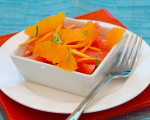Spice Up the Holidays
Spice up the holidays and boost your health with warm, bright spices like cinnamon, nutmeg, and ginger. You can add further health benefits by combining those spices with foods like oranges and cranberries, or drinks like black tea. So, how will you add spice to the holidays this year? (Be sure to read all the way to the bottom -- there's a free handout in it for you). Cinnamon: Whether you're mulling cider or baking snickerdoodles, cinnamon is a key to many holiday foods. But how can it improve your health? Well, cinnamon may have anti-inflammatory properties, aiding your body's resistance to both bacterial and fungal infections. It's even been useful in battling yeast infections. Plus, according to Diabetics Care, cinnamon may help improve your blood glucose and blood lipid levels. Further research is needed, but the initial findings are promising.
Cinnamon: Whether you're mulling cider or baking snickerdoodles, cinnamon is a key to many holiday foods. But how can it improve your health? Well, cinnamon may have anti-inflammatory properties, aiding your body's resistance to both bacterial and fungal infections. It's even been useful in battling yeast infections. Plus, according to Diabetics Care, cinnamon may help improve your blood glucose and blood lipid levels. Further research is needed, but the initial findings are promising.
- For more information about cinnamon's possible health benefits, check out this collection of the latest research.
- There's also a great writeup about cinnamon at WH Foods.
- The recipe archives are chock-full of cinnamon recipes. Try apple cinnamon muffins, spiced cranberries, broccoli salad, or simply sprinkling cinnamon on sliced apples or stirring some into your tea. You can also browse the full cinnamon recipe guide.
 Nutmeg: Like cinnamon, nutmeg also has antibacterial properties. In fact, it can cut down on the bacteria that builds up in your mouth and causes bad breath. Did you know that nutmeg and its oils can be ingredients in toothpaste? Plus, nutmeg can ease digestive distress and reduce flatulence. Be sure to eat nutmeg in small doses -- a little bit goes a long way and too much is quite bad for you.
Nutmeg: Like cinnamon, nutmeg also has antibacterial properties. In fact, it can cut down on the bacteria that builds up in your mouth and causes bad breath. Did you know that nutmeg and its oils can be ingredients in toothpaste? Plus, nutmeg can ease digestive distress and reduce flatulence. Be sure to eat nutmeg in small doses -- a little bit goes a long way and too much is quite bad for you.
- Nutmeg recipes abound on foodandhealth.com. Some favorites include cranberry bread pudding, banana nog, and chocolate ginger cookies. Get the full nutmeg recipe guide today.
- For more information about nutmeg, check out Complete WellBeing's Nutmeg Analysis.
 Ginger: When it comes to spices, we may very well have saved the best for last. Ginger is a powerhouse of health benefits, with many reputable studies backing up its great effects. Ginger can be used to reduce nausea and has been especially effective at reducing morning sickness in pregnant women. It also has anti-inflammatory properties that can reduce menstrual and joint pain.
Ginger: When it comes to spices, we may very well have saved the best for last. Ginger is a powerhouse of health benefits, with many reputable studies backing up its great effects. Ginger can be used to reduce nausea and has been especially effective at reducing morning sickness in pregnant women. It also has anti-inflammatory properties that can reduce menstrual and joint pain.
- Learn more about ginger with fact sheets from the National Center for Complementary and Alternative Medicine (NCCAM) and MedlinePlus.
- Ginger is a very versatile ingredient that can make it onto any holiday menu. Try a ginger apple crisp, gingered holiday vegetables, or pumpkin flan with candied ginger. Of course, you can also check out the full list of ginger recipes.
Now let's move on to the foods that can spice up your holiday table and offer health benefits galore, but which are not technically spices. We're talking about cranberries, oranges, and tea. Cranberries: Cranberries are the bee's knees. According to NCCAM, "Historically, cranberry fruits and leaves were used for a variety of problems, such as wounds, urinary disorders, diarrhea, diabetes, stomach ailments, and liver problems. More recently, cranberry has been used as a folk or traditional remedy for urinary tract infections [UTIs] or Helicobacter pylori (H. pylori) infections that can lead to stomach ulcers, or to prevent dental plaque. Cranberry has also been reported to have antioxidant and anticancer activity." MedlinePlus backs up those statements, maintaining, " Research shows that drinking cranberry juice cocktail can help prevent repeated UTIs in older women and pregnant women. Additional research shows that drinking cranberry juice can also help prevent UTIs in hospitalized patients. […] Cranberry, as well as many other fruits and vegetables, contains significant amounts of salicylic acid, which is an important ingredient in aspirin. Drinking cranberry juice regularly increases the amount of salicylic acid in the body. Salicylic acid can reduce swelling, prevent blood clots, and can have antitumor effects."
Cranberries: Cranberries are the bee's knees. According to NCCAM, "Historically, cranberry fruits and leaves were used for a variety of problems, such as wounds, urinary disorders, diarrhea, diabetes, stomach ailments, and liver problems. More recently, cranberry has been used as a folk or traditional remedy for urinary tract infections [UTIs] or Helicobacter pylori (H. pylori) infections that can lead to stomach ulcers, or to prevent dental plaque. Cranberry has also been reported to have antioxidant and anticancer activity." MedlinePlus backs up those statements, maintaining, " Research shows that drinking cranberry juice cocktail can help prevent repeated UTIs in older women and pregnant women. Additional research shows that drinking cranberry juice can also help prevent UTIs in hospitalized patients. […] Cranberry, as well as many other fruits and vegetables, contains significant amounts of salicylic acid, which is an important ingredient in aspirin. Drinking cranberry juice regularly increases the amount of salicylic acid in the body. Salicylic acid can reduce swelling, prevent blood clots, and can have antitumor effects."
- Want to see the science for yourself? Visit NCCAM's cranberry page or MedlinePlus's evaluation of the research surrounding the health benefits of cranberries.
- Cranberries just scream "holiday fun." Whip up a batch of cranberry orange loaves, cranberry pear relish, cran-razzle tea, or pick your favorite recipe from the archive of cranberry recipes.
 Oranges: Oranges are well-known for their high vitamin C content, but do you know what the benefits of that content are? Vitamin C is key to the healing of wounds, along with the growth and repair of cells and tissues. It also helps block some of the damage that free radicals can cause. That's because it's an antioxidant. Flavanones in oranges may also help reduce blood pressure. Oranges are great. Eat the whole fruit instead of juice for the full complement of nutrients and fiber.
Oranges: Oranges are well-known for their high vitamin C content, but do you know what the benefits of that content are? Vitamin C is key to the healing of wounds, along with the growth and repair of cells and tissues. It also helps block some of the damage that free radicals can cause. That's because it's an antioxidant. Flavanones in oranges may also help reduce blood pressure. Oranges are great. Eat the whole fruit instead of juice for the full complement of nutrients and fiber.
- There's lots of info out there about the health benefits of oranges, especially their vitamin C content. Review the fact sheets from WH Foods, the U.S. National Library of Medicine, and the Office of Dietary Supplements for more information.
- Cooking and baking with oranges has never been easier. Try an orange and indigo beet salad, a citrus cup, or a baby spinach and orange salad. There are even more orange recipes in the recipe database.
Tea: Now when it comes to health benefits for the holidays, this time we're focusing on black tea. According to MedlinePlus, "Black tea is used for improving mental alertness as well as learning, memory and information processing skills. It is also used for treating headache and low blood pressure; preventing heart disease, including “hardening of the arteries” (atherosclerosis) and heart attack; preventing Parkinson's disease; and reducing the risk of stomach and colon cancer, lung cancer, ovarian cancer, and breast cancer. It is also used for type 2 diabetes, stomach disorders, vomiting, diarrhea, and as a diuretic to increase urine flow. Some people use black tea for preventing tooth decay and kidney stones. In combination with various other products, black tea is used for weight loss." Whew! What can't it do?Another comprehensive look at the health benefits of black tea comes from Critical Reviews in Food Science and Nutrition's article "A thought on the biological activities of black tea," which states, "black tea possesses many biological effects on the organisms. It acts as an effective antioxidant because of its free radical-scavenging and metal-chelating ability. Due to this, it is active against inflammation, clastogenesis, and several types of cancer. Tea reduces DNA damage and mutagenesis due to oxidative stress or the presence of pro-mutagens through antioxidant function, blocking activation pathways of mutagens, suppressing transcription of enzymes involved etc. Inhibition of low-density lipoprotein (LDL) peroxidation, suppression of fatty acid synthase etc., suggest that tea may have a role in preventing cardiovascular diseases. Some epidemiological studies support the protective role of black tea against cardiovascular diseases but some do not. Besides, black tea has beneficial effects on the gastrointestinal tract; it affects motility, absorption, microflora etc., by influencing the hormonal balance and antioxidant function black tea improves bone mineral density. It is also antiviral due to its enzyme-inhibiting and receptor-blocking properties. Although its role in cancers of the gastrointestinal tract, liver, and prostate is confirmed, its effect against urinary tract cancer is uncertain and further studies are required."
- For more information about the health benefits of black tea, visit MedlinePlus or PubMed. There are also more articles about tea and its health benefits right here at Food and Health.
- Tea can be delicious! Try spiced apple tea or a tea latte today.
Remember, there's no need to approach each of these elements one at a time. Try making a recipe that combines several of the healthful foods and spices we've featured today. There's tons of information in the recipe database, and we've published many award-winning books on cooking for health as well. Check out some customer favorites below...Download a spice handout: SpiceHolidays

 The wait is over! Download a free recipe PDF that features many of these amazing and healthful ingredients.Talk with your doctor or RDN before taking any herbal supplements. This post is simply a fun look at possible benefits of spices and an encouragement to use spices in cooking. It is not intended to be health advice.
The wait is over! Download a free recipe PDF that features many of these amazing and healthful ingredients.Talk with your doctor or RDN before taking any herbal supplements. This post is simply a fun look at possible benefits of spices and an encouragement to use spices in cooking. It is not intended to be health advice.
